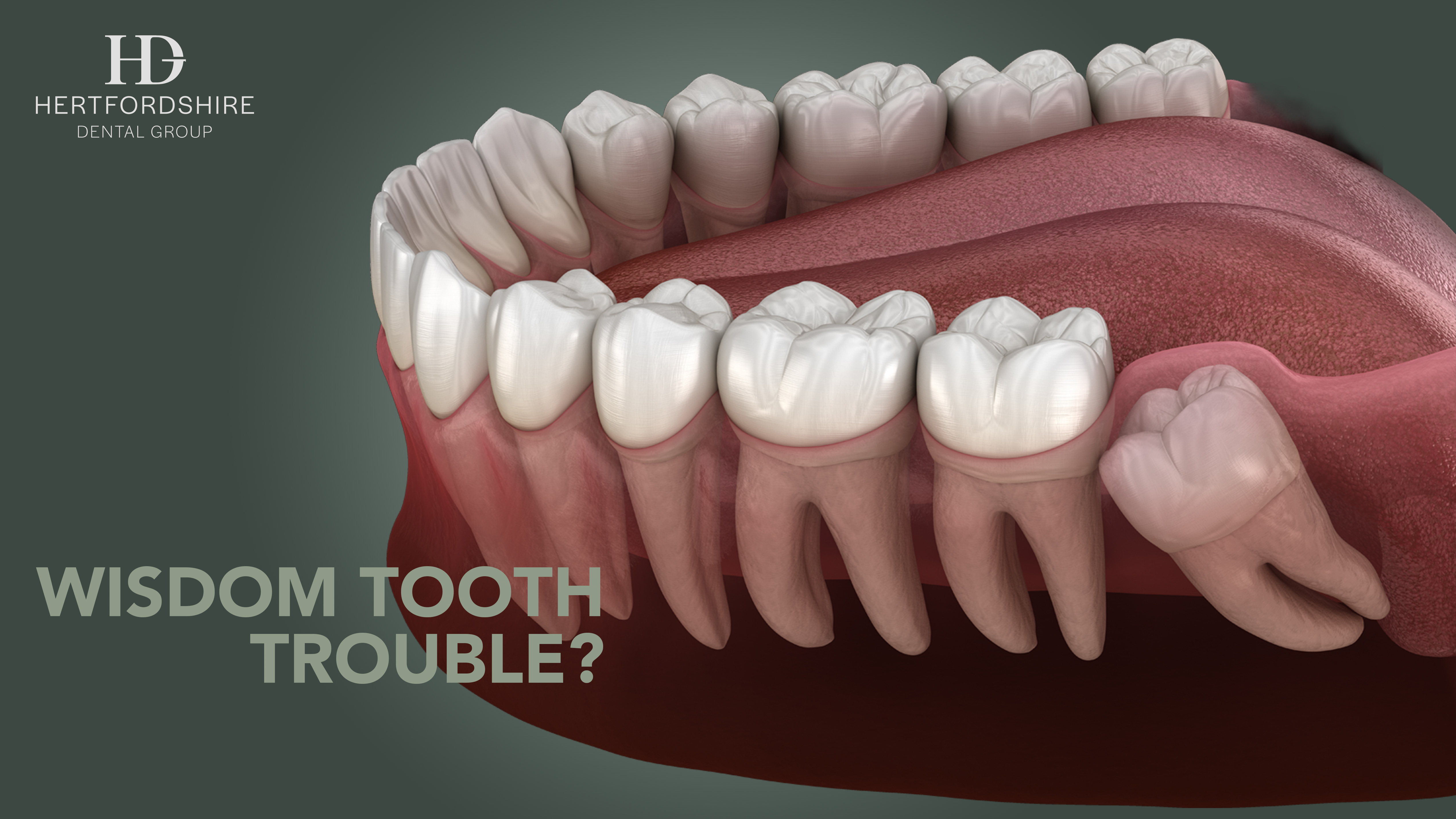HDG NEWS
Words of Wisdom: Your complete guide to Tooth Extraction in Hertford and Ware
24th April 2025

Did you know that once upon a time we humans relied on wisdom teeth to survive? Nowadays they can often prove troublesome and need removal by a dentist.
Adults can have up to 32 teeth. The wisdom teeth are the last to appear, right at the back of the mouth. They usually appear when you are between 17 and 25, although sometimes they appear many years later.
Why Do We Have Wisdom Teeth?
Thousands of years ago, our ancestors would have had diets that consisted of tough, raw foods like roots, nuts, and uncooked meat. To process these foods, a larger jaw and extra molars were necessary. Wisdom teeth helped with grinding and chewing.
However, thanks to advances in food preparation and processing methods our diets have become a lot easier to chew. As humans evolved our jaws became smaller, but the development of wisdom teeth persisted. This mismatch often leads to problems, like impaction, crowding, or infections, because our jaws simply don't have enough space to accommodate them.
Why are they called Wisdom Teeth?
Wisdom teeth got their name because they typically emerge later in life, between our late teens and early twenties, a time when individuals are considered to be gaining maturity and “wisdom.” The term has been used for centuries and reflects this association with adulthood and growth.
While they don't boost brainpower, they do keep oral surgeons busy!
Dentists typically refer to wisdom teeth as "third molars." This name reflects their position as the last set of molars in the back of the mouth.
Benefits of Wisdom Tooth Removal
If your wisdom teeth aren’t causing you any problems, then we don’t recommend removing them. However, if you are in pain, and dealing with impacted, twisted or displaced teeth, removing these ‘third molars’ can help in several ways:
Reduce Pain: Wisdom teeth that are impacted or pushing against other teeth can cause significant discomfort. Removing them prevents future pain and swelling.
Prevent Infection: Wisdom teeth can create spaces for bacteria to thrive, increasing the risk of gum infections and tooth decay. Extraction reduces this risk.
Stop Crowding: Wisdom teeth often don’t have enough room to emerge properly, which can misalign neighboring teeth. Extraction protects your smile’s alignment.
Reduce Risk of Cysts or Tumors: Occasionally, wisdom teeth can develop cysts or other growths around the crown of an unerupted wisdom tooth, which may damage your jawbone or surrounding teeth. Removing them eliminates this risk.
Improve Oral Hygiene: Wisdom teeth are tricky to clean due to their location, making them more vulnerable to decay. Without them, maintaining oral health becomes easier.
Other reasons for tooth Extraction
Tooth extraction is a common dental procedure, but it's not only reserved for troublesome wisdom teeth. There are several other reasons why a tooth might need to be removed to maintain oral health and overall wellbeing. Here are some of the main ones:
Gum Disease (Periodontitis): Advanced gum disease can weaken the support structures around a tooth, like the gums and bone. When a tooth becomes too loose to function properly, removal is often the best option to protect the health of the rest of the mouth.
Overcrowding: Lack of space in the mouth can lead to pain, discomfort and issues with biting. In preparation for orthodontic treatment, a dentist might also recommend extracting a tooth to create space. This ensures proper alignment of the remaining teeth and helps achieve a straighter smile.
Trauma or Injury: Teeth damaged beyond repair due to accidents or injuries may need to be extracted. This is particularly true if the damage compromises the tooth's structure or the surrounding tissues.
Infection: In cases where an infection occurs within or around a tooth and doesn't respond to antibiotics or other treatments, extraction may be necessary to prevent it from spreading further.
Impacted Teeth: Sometimes, other teeth—like canines—can become impacted, failing to erupt properly. If they cause pain or affect the alignment of other teeth, extraction might be required.
Tooth extraction is always a last resort when other dental treatments can't save the tooth. Our team at Hertfordshire Dental Group will guide you through the process and ensure the most comfortable and suitable solution for your oral health needs.
Maintaining good oral hygiene and visiting your dentist regularly can help prevent many of these issues.
Wisdom Tooth Extraction in Hertford & Ware
If you choose Hertfordshire Dental Group for your wisdom tooth removal you can be pain-free in no time as there are no waiting lists, and appointments are often available within one week and after assessment our patients can expect to undergo treatment within one month.
Our dental team typically begins by assessing your wisdom teeth with X-rays to determine the position of the root and whether there is enough space for the tooth to emerge in a functional position. In many cases, we can swiftly remove the tooth under local anaesthesia.
For severely impacted wisdom teeth, a hospital referral may be necessary, which your dentist can help arrange.
To manage discomfort while waiting for your appointment, rinsing with warm salt water several times a day can ease gum soreness and reduce inflammation. Swishing the salt water around the affected area, especially where your toothbrush may struggle to reach, is helpful. Pain relief from over-the-counter medications like paracetamol or ibuprofen can also provide temporary relief.
Wisdom tooth extraction is a common procedure, and we've successfully performed it for many satisfied clients in Hertford and Ware. Check out some of our 5-star reviews to see how we've helped others feel comfortable and cared for during their treatment.
We understand that dental extractions can make some people feel uneasy, but rest assured that your comfort is our priority. From explaining the process and discussing your options to providing exceptional aftercare, our team is here for you every step of the way. Let us help make your experience positive and stress-free!
If you have a wisdom tooth that’s causing you worry, get in touch today.
